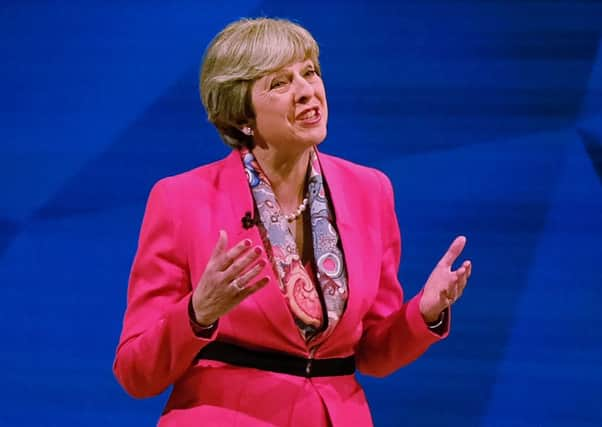Theresa May '˜not prepared' to sign bad Brexit deal


The Prime Minister was cheered for sticking by her stance that “no deal is better than a bad deal” on Brexit, but was laughed at by the studio audience for dismissing a Leave campaign promise of £350 million for the NHS after Brexit, saying: “A number of claims were made.”
The two party leaders took part in separate audience Q&A sessions before one-on-one interviews with Jeremy Paxman. Both emerged largely unscathed from the encounter, which failed to produce a stand-out moment of drama.
Advertisement
Hide AdAdvertisement
Hide AdBut Mr Paxman drew applause for asking the Prime Minister why she and her spokespeople had promised on six occasions that there would not be a general election before 2020.
On Brexit, Mr Paxman asked the Prime Minister: “So you are prepared to walk away?” She replied: “I think you have to. In negotiations you have to recognise that you’re not in there to get a deal at any price.”
Mrs May faced questions on controversial social plans, cuts to the police and health spending in England, and was challenged over whether her boasting about being called a “bloody difficult woman” risked returning the Tories to the “nasty party” image which she fought against in the past.
Mrs May said: “That’s what drives me. Doing what is the right thing by the country. Sometimes you have to be difficult in order to do that.”
She rejected claims that she failed to tackle immigration while home secretary, saying: “There is no single moment where you take one measure which changes the immigration figures.
“It’s a constant work to ensure you’re dealing with immigration and ensuring there is no more abuse in the system. There’s more work to be done.”
Jeremy Corbyn faced lengthy questioning on foreign policy and security, defending his claim that the killing of Osama bin Laden was a “tragedy” because the al-Qaeda chief should have been put on trial.
The Labour leader weathered stiff questioning on his support for the IRA, his opposition to nuclear weapons, and previously calling members of the terrorist group Hamas his “friends”. He insisted Labour wouldn’t “soften” UK foreign policy in the wake of a speech in which he said overseas military interventions had make the country less safe.
Advertisement
Hide AdAdvertisement
Hide AdAsked for his approach to tackling violent Islamist extremism, Mr Corbyn said: “We have to cut off the funds for IS, cut off the arms for IS, cut off their publicity as well, but also bring about a peace process in Syria by reconvening the Geneva talks.”
Asked what he would do if he was given 20 minutes to decide whether authorise a lethal strike on a terrorist suspect, Mr Corbyn said he would insist on looking at “all the evidence”, but would not answer a “hypothetical” scenario.
On domestic policy, the Labour leader said he saw himself as a listening politician when challenged by a man who said he did not see Mr Corbyn as “someone who could run this country”.
Mr Corbyn appealed to another audience member from a “salt of the earth” Labour family to “think again” after he could not vote for “ruthless” policies that would damage his small business, such as the abolition of zero hours contracts and the imposition of a £10 minimum wage.
The Labour leader defended plans to raise corporation tax to 26 per cent, saying: “This country is badly divided between the richest and the poorest. You put corporate tax and tax at the top end down, the division gets greater.”
He added: “You don’t address these problems by ignoring them.” Mr Corbyn claimed the Labour manifesto would be “transformational”, saying: “We are all better off, when everybody is better off”.
He refused to be drawn on immigration levels after Brexit although he said it would “probably” be no higher than at present.
“I am not going to stand here and put a figure. Our Prime Minister has done that now in the third election and got nowhere near meeting that figure.”
Advertisement
Hide AdAdvertisement
Hide AdBrexit Secretary David Davis said the debate had brought the election campaign “back to the fundamentals” of “who is going to get the best Brexit deal, and in doing so who will be able to secure our economy, our public services and our national security”.
SNP deputy leader Angus Robertson claimed the programme showed that Mrs May “doesn’t have the answers on the most basic questions”.